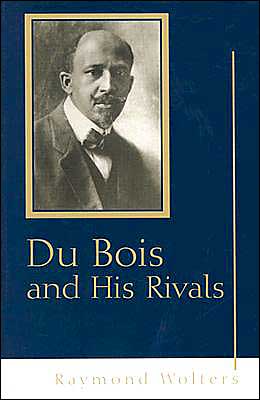

 |

|

The average rating for Du Bois and His Rivals based on 2 reviews is 4 stars.
Review # 1 was written on 2016-12-06 00:00:00 John Cleary John ClearyDuBois And The Nature Of American Pluralism W.E.B Du Bois (1868-1963) was one of the leading and most controversial African-American leaders of the 20th Century. He received a PhD from Harvard and wrote in 1903 a short book, "The Souls of Black Folk", which remains an American classic. He wrote several scholarly works on African-American history which are still valuable. He helped found the NAACP and for many years edited its magazine, The Crisis, which worked aggressively and tirelessly for civil and political rights for African-Americans. Near the end of his long life, Du Bois became embittered with the United States. He became a communist,, renounced his American citizenship, and died in Ghana in 1961 at the age of 95. In his informative and clearly-written history, Professor Wolters discusses the nature of Du Bois's accomplishment by discussing his relationships, his agreements and disagreements, with other African-American leaders of his day. The book is an important study of the history of black America (indeed of all America) and it sets out the many and varied approaches African-American leaders have used to bring justice to their people. Not surprisingly, it shows areas of agreement but also areas of strong disagreement and in-fighting. Professor Wolters contrasts Du Bois, with his emphasis on academic education and on aggressive support of civil rights, with that of Du Bois's predecessor and rival, Booker T. Washington. He also stresses the large areas of agreement between the two men. Similarly, Wolters discusses Du Bois's reactions to Marcus Garvey, a black leader in the 1920's with broad mass appeal who tried to get American blacks to unite and establish a homeland in Africa. He points out that late in his career Du Bois came close to Garvey's position in many ways, involving African-American self-help from the bottom-up rather than from the top-down. Wolters then describes Du Bois's break with the NAACP and its leader Walter White. The break was occasioned by the NAACP's commitment to integration. Du Bois had moved away from this approach arguing instead that black Americans ought to work among themselves and within their community to achieve economic, political and social justice. Wolters gives a relatively brief treatment to Du Bois's final years. Wolters finds that a philosophy of pluralism governed Du Bois's efforts throughout his long career. Under his concept of pluralism, black Americans had two identities: an American identity and a black identity. He urged that blacks live in both worlds -- in other words, he urged African-Americans to share in the values of the American experience while creating their own uniquely black contribution to America and to civilization. Early in his career, Du Bois expressed his pluralistic vision as follows (Wolters, p.38): "One ever feels his two-ness,-an American, a Negro; two souls, two thoughts, two unreconciled strivings; two warring ideals in one dark body, whose dogged strength alone keeps it from being torn assunder. The history of the American Negro is the history of this strife." In his commitment to pluralism, Du Bois opposed the earlier 19th Century African-American leader, Frederick Douglass, who was assimilationist in his thinking (there should be no differences between Americans of different colors) as well as, to a degree, later-day integrationists, such as the NAACP and Dr. King. He came closer to the views of Garvey and to the views of Garvey's more modern successors. Du Bois became more militant in his beliefs as he aged. There is a long disagreement between assimilationist and pluralist visions of America in many areas besides African-American history. The tension between the two visions is still with us today as we try to understand and shape our country. The assimilationist vision is that of a melting pot. Pluralists speak in terms of instruments in a symphony orchestra, each with its own voice yet contributing to a whole. Wolters book does not describe in great detail the broader issues between assimilationism and pluralism. He gives an excellent carefully-crafted account of how this question affected African-Americans in their quest for justice. In expressing his own opinions in the book, Wolters is careful to point out areas of alternative interpretations among scholars. The reader thus may form his or her own opinions. This book is a fine study of the life and ideas of a man who, as Wolters observes, is one of the leading figures of the 20th Century. Robin Friedman |
Review # 2 was written on 2015-08-01 00:00:00 Robert O. Worley Robert O. WorleyReading this as part of my Brave Books and Courageous Conversations Class. I really do love books that make me think and challenge me to change my attitude and practice as an educator. Hope this will give me "new eyes". It's been over a month since I read the first chapter and I know that I am going to have a hard time with this and will need to force myself to read it. Sorry....but why do I have to read this? |
CAN'T FIND WHAT YOU'RE LOOKING FOR? CLICK HERE!!!